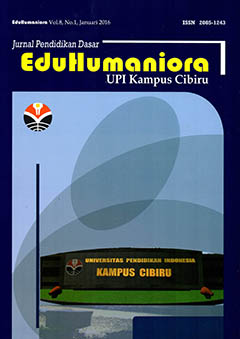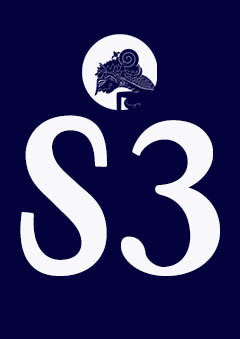INQUIRY-BASED ENVIRONMENTAL LITERACY TO IMPROVE ENVIRONMENTAL CHARACTER CARE OF ELEMENTARY SCHOOL STUDENT
Abstract
The purpose of this study was to determine the effect of inquiry-based environmental literacy used in learning on the environmental care character of third grade students at MI Al Muhsin 1. This research method uses a quantitative approach with a quasi-experimental research model. In this study, learning tools were developed in the form of lesson plans and STUDENT WORKSHEET. The instrument used in this research is a character questionnaire that cares about the environment. Data analysis using t-paired test. Based on the findings, the value of the environmental care character of the students after the treatment was higher than the environmental care character before the treatment. Based on the results of the Paired Sample t-Test statistical test, the significance value was 0.000 or sig. (2-tailed) < 0.05. Thus it can be said that at the 95% confidence level, there is a significant difference in the value of the environmental care character of students before being given treatment and after being given treatment. Inquiry-based environmental literacy learning facilitates students to spread nature, recognize the ecosystem around where they live, understand the damage that occurs in the environment, and be creative with plastic waste.
Keywords
Full Text:
PDFReferences
Amini, R. (2010). Pengaruh Model Pembelajaran Pendidikan Lingkungan Berbasis Outdoor Terhadap Penguasaan Konsep Pendidikan Lingkungan Bagi Calon Guru Sekolah Dasar. Jurnal Penelitian Pendidikan, Volume 11(Nomor 1), Hal 20.
Andrini, V. S. (2016). The Effectiveness of Inquiry Learning Mrthod to Enhance Students Learning Outcome : A Theoritical and Empirical Review. Journal of Education and Practice, Vol 7 No 3.
Banawi, A. (2019). Implementasi Pendekatan Saintifik Pada Sintaks Discovery/Inquiry Learning, Based Learning. Project Based Learning. Jurnal BiologyScience &Education, Vol 8 No 1.
Coyle, K. (2005). Environmental literacy in America. The National Environmental Education & Training Foundation.
Febriana, Indri, D. (2016). Potensi Pembelajaran Inkuiri Dalam Menumbuhkan Sikap Siswa Terhadap Lingkungan. Pros.Semnas Pend.IPA Pascasarjana UM, 1.
Gunadi, R Andi Ahmad, D. (2021). Bahaya Plastik Bagi Kesehatan dan Lingkungan. Seminar Nasional Pengabdian Masyarakat.
Hasanah, S. (2020). The Effect of Guided Inquiry Learning Model on Chemistry Learning Outcomes. Journal of Science and Science Education, Vol 1.
Haske & Wulan.(2015).Pengembangan E-learning berbasis MOODLE dalam Pembelajaran Ekosistem untuk Meningkatkan Literasi Lingkungan Siswa pada Program Pengayaan. Seminar Nasional XII Pendidikan Biologi FKIP UNS 2015
Hollweg. (2011). Developing a framework for assessing environmental literacy. DC:NAAEE.
I A Kusumaningrum, A. A. dan N. Y. I. (2021). Scientific Aprroach and Inquiry Learning Model in the Topic of Butter Solution : A Content Analysis. International Conference on Mathematics and Science Education (ICMScE).
Ikhsan Fuady, dkk. (2016). Efektivitas Komunikasi Lingkungan Hidup Pada Pelajar SD Putera Pertiwi Pondok Cabe Tangerang Selatan. Jurnal Commed, Vol 1 No 1.
Irfianti, Mustia Dewi , Siti Khanafiyah, B. A. (2016). Perkembangan Karakter Peduli Lingkungan Melalui Model Experiental Learning. Unnes Physics Education Journal, Vol 3.
Ismail, M. J. (2021). Pendidikan Karakter Peduli Lingkungan Dan Menjaga Kebersihan di Sekolah. Guru Tua: Jurnal Pendidikan Dan Pembelajaran, Vol 4 No 1.
Karimzadegan, H & Meiboudi, H. (2012). Exploration of environmental literacy in science education curriculum in primary schools in Iran. Procedia-Soscial and Behavioral Sciences.
Littledyke. (2006). Science education for environmental awareness: approaches to integrating cognitive and affective domains. Dalam: Evangelos I. Manolas (Penyunting), Proceedings of the 2006 Naxos International Conference on Sustainable Management and Development of Mountan. Thace: Media University of Crete.
Masturoh, S. R. (2020). Character Building of Environmental Care on Student In Sekolah Indonesia Kota Kinabalu(SIKK) Malaysia. Journal of Biology Education, Vol 2.
Meika, Suciati, P. K. (2016). Pengembangan Modul Berbasis Inquiry Lesson Untuk Meningkatkan Dimensi Konten Pada Literasi Sains Materi Sistem Pencernaan Kelas XI. Jurnal Inkuiri, Vol 5 No 3.
Muthmainah, Nurmiyati, S. D. (2016). Pengaruh Penggunaan Modul Berbasis Potensi Lokal pada Topik Ekosistem terhadap Pemahaman Konsep dan Sikap Peduli Lingkungan Siswa Kelas X. Proceeding Biology Education Conference, Vol 13(1).
Nasreen, A. (2013). A Study of Factors Effecting Academic Achievment of Prospective Teachers. Joutnal of Social Science for Policy Implications, Vol 1 No 1.
NEEF. (2015). Environmental Literacy in the United States : An Agenda for Leadership in the 21 Century. DC : National Environmental Education Foundation.
Nofiyanti, estin dkk. (2020). Pelatihan Daur Ulang Sampah Plastik Menjadi Souvenir Ramah Lingkungan Di Kabupaten Tasikmalaya. JAMAIKA : Jurnal Abdi Mayarakat Program Studi Teknik Informatika Universitas Pamulang, Volume 1 N.
Oktamarina, L. (2021). Meningkatkan Karakter Peduli Lingkungan Sejak Usia Dini Melalui Kegiatan Green School di PAUD Uswatun Hasanah Palembang. Jurnal Ilmiah Potensia, Vol 8 (1).
Oktavia Fatma Yudianti, Apri Irianto, C. T. R. (2020). Penanaman Karakter Peduli Lingkungan Melalui Program Sekolah Adiwiyata. JPD : Jurnal Pendidikan Dasar.
Ozgurler, S & Cansaran, A. (2014). Study Of Environmental Literacy and Sustainable Development. International Electronic Journal Of Environmental Education.
Ozsoy. (2012). Can-eco-school improve elementary school students’environmental literacy level? Asia-Pacific Forum Science Learning and Teaching.
Purwanti, D. (2017). Pendidikan Karakter Peduli Lingkungan Dan Implementasinya. DWIJACENDEKIA, Vol 2.
Rejeki, Suprapti & Riyadi, S. (2021). Problem Based Learning and Guided Inquiry Learning Model on Critical Thinking Ability. International Journal On Emerging Mthematics Education (IJEME), Vol 5 No 1.
S, K. (2011). Investigation of undergraduate students’ environmental attitudes. International Electronic Journal of Environmental Education 1, 2.
Srbinovski, M., Erdogan, M. &Ismaili, M. (2010). Environmental Literacy in the science education curriculum in Macedonia and Turkey. Procedia Social and Behavioral Sciences.
Tumisem. (2007). Program Pendidikan Lingkungan Berbasis Ekologi Perairan sebagai Upaya Pengembangan Literasi Lingkungan dan Konservasi melalui Kepramukaan di Sekolah Dasar. Disertasi Doktor pada SPs UPI.
Wulandhari, C. A. (2019). Peran Guru Dalam Pembentukan Karakter Peduli Lingkungan Melalui Pembelajaran Tematik Di Kelas IV SD 1 Sewon. Prosiding Seminar Nasional PGSD.
DOI: https://doi.org/10.17509/eh.v14i2.40529
Refbacks
- There are currently no refbacks.
Copyright (c) 2022 EduHumaniora | Jurnal Pendidikan Dasar Kampus Cibiru
EduHumaniora: Jurnal Pendidikan Dasar
Published in collaboration Program Studi PGSD UPI Kampus Cibiru
and
HDPGSDI
This work is licensed under a Creative Commons Attribution-ShareAlike 4.0 International License.















